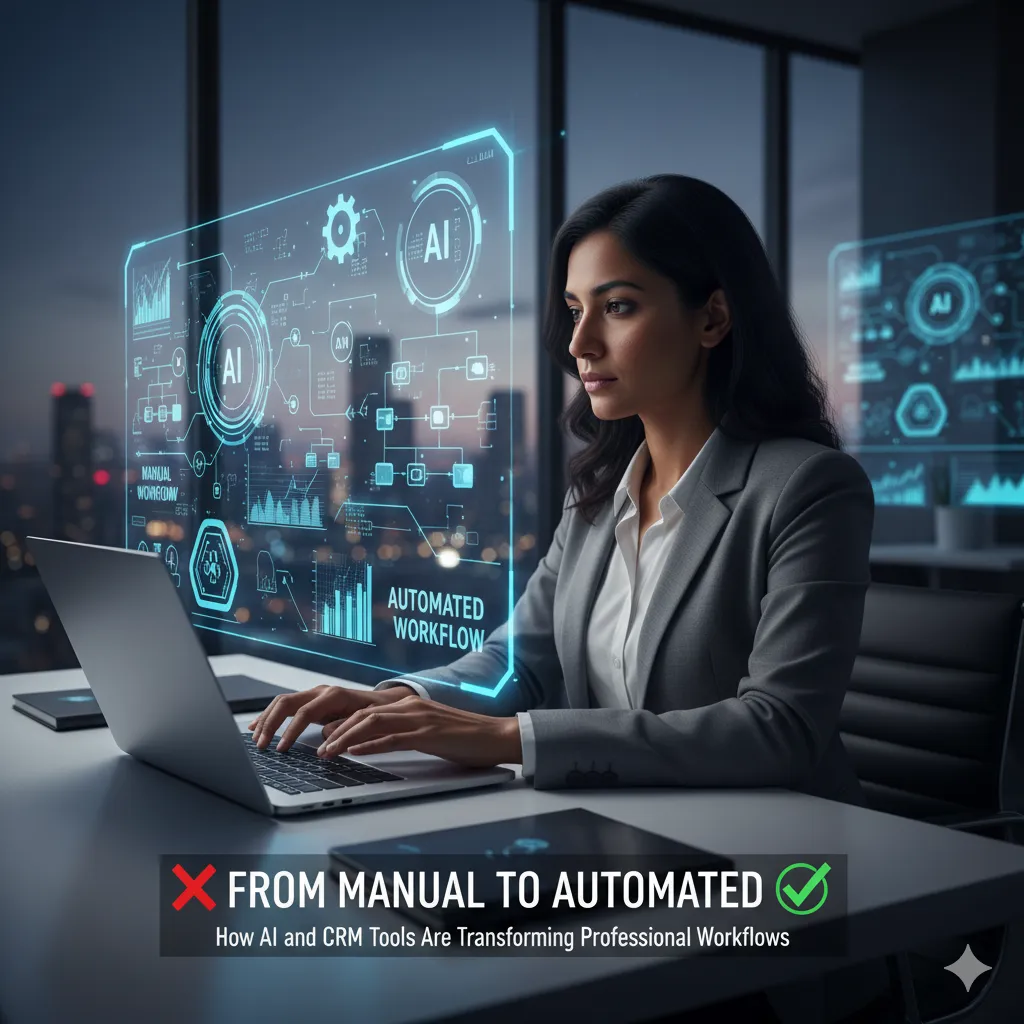
From Manual to Automated: How AI and CRM Tools Are Transforming Professional Workflows
"Automation applied to an inefficient operation will magnify the inefficiency. Automation applied to an efficient operation will magnify the efficiency.” – Bill Gates
For decades, professionals relied on manual processes—paper files, spreadsheets, and endless phone calls. While these methods worked in their time, they can no longer keep pace with today’s digital-first world. That’s where AI (Artificial Intelligence) and CRM (Customer Relationship Management) systems come in.
Together, these tools are transforming workflows across industries, from real estate and sales to marketing and consulting. They don’t just improve efficiency—they redefine how professionals build relationships, close deals, and grow their careers.
In this blog, we’ll explore the benefits of automation, common challenges, and practical steps to transition from manual to automated workflows.

Why Manual Processes Are Holding You Back
Time-Consuming Tasks: Manually updating client lists or following up one by one eats valuable hours.
Human Error: Missed appointments, forgotten leads, or data entry mistakes can cost revenue.
Limited Scalability: As your client base grows, manual methods quickly collapse under pressure.
A growth mindset (discussed in The Growth Mindset Advantage: How Professionals Can Build Habits for Long-Term Success) teaches us to view these inefficiencies not as barriers but as opportunities to evolve.
The Power of AI in Professional Workflows
AI tools are no longer futuristic—they’re practical, affordable, and accessible. Here’s how they’re already reshaping work:
Smart Lead Generation
AI chatbots can qualify leads 24/7, answering common questions and booking consultations while you sleep.Predictive Analytics
AI helps identify which clients are most likely to close, allowing professionals to prioritize efforts.Content Creation & Marketing
From blog drafts to social media captions, AI accelerates the creative process (always with a human touch to ensure quality).Personalized Client Experiences
Automation ensures follow-ups are timely and tailored, building stronger trust with clients.
CRM Systems: The Backbone of Digital Transformation
CRM platforms integrate client data, communication, and tasks into one central hub. For real estate professionals, sales teams, and service providers, they act as a command center.
Centralized Data: All client information stored in one place.
Automated Follow-Ups: Never forget to check in with a lead or renew a contract.
Pipeline Visibility: Clear view of where each deal stands.
Team Collaboration: Sales, marketing, and support teams work seamlessly together.
We’ll see this applied in industries like real estate in our upcoming post: PropTech and Beyond: Real Estate Technology Trends Every Professional Should Watch in 2025.
Challenges in Shifting from Manual to Automated
Transitioning is not without hurdles:
Learning Curve: Adapting to new systems requires training.
Cost Concerns: Initial investment may deter small businesses.
Resistance to Change: Professionals with a fixed mindset may resist digital tools.
These are the same challenges we’ll explore further in From Struggle to Strength: Stories of Professionals Thriving Through Digital Transformation.
Best Practices for Adopting AI & CRM
Start Small: Automate one process (like appointment reminders) before scaling.
Choose Tools That Fit: Not every CRM is right for every business—evaluate your industry’s needs.
Invest in Training: A system is only as good as the people using it. (See more in Essential Professional Skills for 2025: Sales, Leadership, and Digital Fluency).
Measure ROI: Track efficiency gains, lead conversions, and client satisfaction.
Final Thoughts
Moving from manual to automated workflows isn’t just about saving time—it’s about unlocking potential. AI and CRM tools give professionals the freedom to focus on what truly matters: building relationships, closing deals, and driving innovation.
As digital transformation accelerates, those who adapt early will lead the future. Those who don’t risk being left behind.
✅ Soft Call-to-Action
Ready to explore AI and automation for your business or practice? Let’s connect and discuss how to integrate these tools into your workflows.
🔎 Sources
McKinsey & Company: The State of AI in 2023
Salesforce: CRM Trends Report 2024
Forbes: AI in Business: Practical Use Cases
